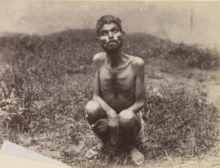Dina Sanichar
Appearance

Dina Sanichar (1860 or 1861–1895) was a feral child. Sanichar was discovered by a group of hunters among wolves in a cave in Bulandshahr, Uttar Pradesh, India in February 1867,[1] at the age of around six.[2][3][4][5] Sanichar was taken to Sikandra Mission Orphanage[6] where he was given the name "Sanichar" because he arrived on a Saturday.[7] When he arrived at the orphanage, he reportedly walked on all fours and ate raw meat.[8] While he could not speak, he would make sounds similar to a wolf.[3] He went on to live among other humans for over twenty years but never learned to speak and remained seriously impaired his entire life.[4][9] Sanichar was a heavy smoker.[10] He died of tuberculosis in 1895.[6]
Wikimedia Commons has media related to Dina Sanichar.
References
- ^ Kaul, Ikbal (1978-10-15). "During the last century, nearly 50 cases of wolf children reported in India". India Today. Retrieved 2021-04-07.
{{cite web}}: CS1 maint: url-status (link) - ^ Degregory, Lane (2008-08-03). "Feral children through the ages". www.tampabay.com. Retrieved 2021-04-07.
{{cite web}}: CS1 maint: url-status (link) - ^ a b Mathur, Priyanshi (2018-12-10). "Meet The Real-Life Mowgli - Dina Sanichar Who Was Raised By A Pack Of Wolves". IndiaTimes. Retrieved 2021-04-07.
{{cite web}}: CS1 maint: url-status (link) - ^ a b Malson, Lucien (1972). Wolf children and the problem of human nature. New York and London: Monthly Review Press. p. 45. ISBN 9780902308244.
- ^ Ferris, George C. (3 June 1902). Sanichar the Wolf-Boy of India (PDF). New York City. p. 20.
{{cite book}}: CS1 maint: location missing publisher (link) - ^ a b "Legendary wildlife conservators and jungle lore". The Statesman. 2013-11-06. Retrieved 2021-04-07.
- ^ "Real story of Mowgli Netflix Movie: Who was Mowgli. The Jungle Book character & how did it inspire Netflix's 2018 Hindi movie Mowgli". GQ India. Retrieved 2021-04-07.
- ^ Wyness, Michael (2018-06-27). Childhood, Culture and Society: In a Global Context. SAGE. ISBN 978-1-5264-2250-7.
- ^ Zingg, Robert M. (1940). "Feral man and extreme cases of isolation". The American Journal of Psychology. 53 (4): 487–517. doi:10.2307/1417630. JSTOR 1417630.
- ^ Malson, Lucien (1972). Wolf Children. NYU Press. ISBN 978-0-85345-264-5.
